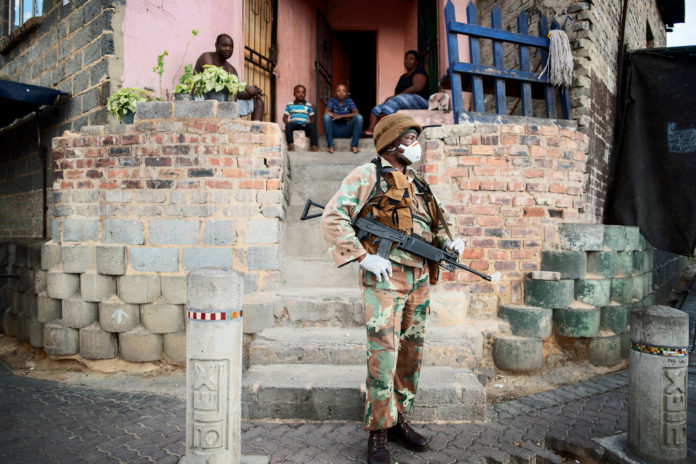By Daniel den Hollander
When I think of autonomy, I think of that iconic scene in the movie Braveheart, where William Wallace (Mel Gibson) delivers a rallying speech to his Scottish countrymen about to face the attack of their oppressors. He finishes his sterling address with the following line: “They may take our lives, but they may never take our freedom”. A true goosebump moment that lives long in my memory. Resonating with its viewers.
Autonomy is an important step in our own actualisation process. We make a big deal of it: at our 21st birthday we get a key, symbolising our independence and trust that we are able to self-regulate and be responsible. Our country holds proudly our Bill of Rights; our Constitution safeguards our autonomy. But what happens when our freedom risks our own health and safety? Like in a lockdown.
It’s been quite a ride. The freedom to congregate, to socialise, to watch our favourite sports team. To invite our friends over for a braai. Suddenly we are pre-eighteen: we can’t drink, we can’t smoke, we can’t go out. Our autonomy is threatened. And we find ways to recapture this. Do we comply or do we rebel? Purchasing pineapple and yeast…
With a rebellious teenager comes an over-controlling parent: the army and police visible in the public space. We worry. There is a history of an army in public spaces. Viral YouTube videos of non-compliant citizens forced to hop like frogs make us fear our Big Mama, our Big Papa. They tell us what we can and can’t do. So, like a rebellious teenager, whilst Mama and Papa are asleep, we sneak off for an evening run.
But we can be so busy with our restricted autonomy that we miss a deeper issue – the reason why we have such heavy restrictions is because we don’t have the infrastructure for the demands of an outbreak. We know that the Department of Health has long been in a state of disarray (e.g. the Life Esidimeni Disaster). Well, we do have the infrastructure, if you can afford it.
Having spent a decade in Public Specialised Health Care, and having experienced the silenced military lockdown of Kimberley in 2018 due to protests of poor access to basic human rights needs such as water, electricity, housing and sewerage disposal, I want to share my concern that there is another reality. As a South African, your reality is determined by your socioeconomic level. If you are middle class, you suffer a threat on your autonomy and possibly your long-term financial independence. However, if you live hand to mouth, your basic needs are threatened and you starve. And herein lies the true rock and a hard place: finding the balance between lowering the curve of mass infection, and lowering the curve of impoverishment. The dilemma of our unfortunate welfare state.
But who keeps this balance?
It is not the politicians, nor the army, nor the police. It is the citizens, guided by our leaders. This requires trust, trust that we are holding each other’s intentions at heart. You cannot demand trust. Then you force trust and that necessarily becomes violent and aggressive. Instead, trust is earned. You earn it through working together, through ubuntu. I am through you, you are through us. This is our hope. What we do as a collective is our best defence against the pandemic. Staying at home, restricting contact, financially assisting those who depend on us for employment, sharing relevant information and not spreading fake news, these are all important tasks for preserving each other’s humanity.
And when the crescendo of this pandemic comes closer, our trust in each other will be fully tested.
As I say this I am so aware of my middle class status. I remember when it was announced that COVID-19 sites would be at public hospitals and the fear of middle class citizens that they would be subjected to ‘Public Services’. The state of Public Services! Why are we only raising this concern now? Nelson Mandela, in 2005, stated “As long as poverty, injustice, and gross inequality persist in our world, none of us can truly rest.” Did we accidentally rest?
And here comes the question: As a member of the middle class, what are my responsibilities during the lockdown?
Autonomy is important, all lives matter, but not all voices have the means to be heard. Autonomy is about maintaining a person’s respect and their will. Humane restrictions are difficult. We cannot pretend that human rights violations haven’t happened. For example the death of Collins Khoza, to which the Minister of Defence has publicly apologised; and the controversial handling of homeless people at Strandfontein Sports Complex. The middle class have the essential job to advocate the rights of all South Africans, not only the rights of the middle class. The only thing necessary for the triumph of evil is for good people to do nothing. Fortunately, this has not happened. NPOs and public initiatives have played a vital role in protecting human dignity through clothing the naked and feeding the hungry, so that at least there is the dignity of some people having their basic needs met.
When we talk about the importance of autonomy, let us not forget that it starts with respecting each other’s dignity. Let us hold the humanity of each other through our own actions, now during the lockdown period, and past it, when our autonomy might be restored, but not the poverty, injustices and gross inequalities that our fellow South Africans endure.
Daniel den Hollander is a practising clinical psychologist, and the current chair of PiPS (Psychology Professionals in Public Service), a division of PsySSA. This is an edited transcript of his podcast.



